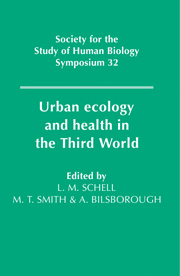Book contents
- Frontmatter
- Contents
- List of contributors
- Acknowledgements
- 1 Human biological approaches to the study of Third World urbanism
- 2 Social and cultural influences in the risk of cardiovascular disease in urban Brazil
- 3 The urban disadvantage in the developing world and the physical and mental growth of children
- 4 Differences in endocrine status associated with urban-rural patterns of growth and maturation in Bundi (Gende-speaking) adolescents of Papua New Guinea
- 5 Nutritionally vulnerable households in the urban slum economy: a case study from Khulna, Bangladesh
- 6 Urban-rural differences in growth and diarrhoeal morbidity of Filipino infants
- 7 Child health and growth in urban South Africa
- 8 From countryside to town in Morocco: ecology, culture and public health
- 9 Urban-rural population research: a town like Alice
- 10 Selection for rural-to-urban migrants in Guatemala
- 11 Health and nutrition in Mixtec Indians: factors influencing the decision to migrate to urban centres
- 12 Urban health and ecology in Bunia, N.E. Zaire, with special reference to the physical development of children
- 13 Food for thought: meeting a basic need for low-income urban residents
- 14 Immunological parameters in northeast Arnhem Land Aborigines: consequences of changing settlement patterns and lifestyles
- 15 Amerindians and the price of modernisation
- 16 Sex ratio determinants in Indian populations: studies at national, state and district levels
- 17 Polarisation and depolarisation in Africa
- 18 Urbanisation in the Third World: health policy implications
- Index
13 - Food for thought: meeting a basic need for low-income urban residents
Published online by Cambridge University Press: 26 December 2009
- Frontmatter
- Contents
- List of contributors
- Acknowledgements
- 1 Human biological approaches to the study of Third World urbanism
- 2 Social and cultural influences in the risk of cardiovascular disease in urban Brazil
- 3 The urban disadvantage in the developing world and the physical and mental growth of children
- 4 Differences in endocrine status associated with urban-rural patterns of growth and maturation in Bundi (Gende-speaking) adolescents of Papua New Guinea
- 5 Nutritionally vulnerable households in the urban slum economy: a case study from Khulna, Bangladesh
- 6 Urban-rural differences in growth and diarrhoeal morbidity of Filipino infants
- 7 Child health and growth in urban South Africa
- 8 From countryside to town in Morocco: ecology, culture and public health
- 9 Urban-rural population research: a town like Alice
- 10 Selection for rural-to-urban migrants in Guatemala
- 11 Health and nutrition in Mixtec Indians: factors influencing the decision to migrate to urban centres
- 12 Urban health and ecology in Bunia, N.E. Zaire, with special reference to the physical development of children
- 13 Food for thought: meeting a basic need for low-income urban residents
- 14 Immunological parameters in northeast Arnhem Land Aborigines: consequences of changing settlement patterns and lifestyles
- 15 Amerindians and the price of modernisation
- 16 Sex ratio determinants in Indian populations: studies at national, state and district levels
- 17 Polarisation and depolarisation in Africa
- 18 Urbanisation in the Third World: health policy implications
- Index
Summary
Introduction
The objective of this paper is to review the main elements of the food supply systems of the urban poor in the Third World, and how these have evolved and are changing within the broader context of the development process. Geographers are by nature interested in the patterns and interlinkages produced within complex systems of social and environmental relationships and in the processes that shape them. In the context of the urban food supply system (Fig. 13.1), such interest encompasses all levels of the system from production through to consumption. Moreover, within each level, analysis must be focused not just on the commodity itself but also on the economic, social, cultural and political factors that influence the nature of the system.
Although in the biological sciences considerable attention is paid to the nutritional problems and related consequences of inadequate diets, the social sciences have failed to match this with their investigations as to why so many people in the world still have inadequate diets when world food production is steadily increasing. As a result of the patchy coverage of what is clearly a complex system, the relationships between each of the components is imperfectly understood. In turn, this makes policy responses less effective.
Such research deficiencies are difficult to explain when they relate to the most important of basic needs. Low-income families in the Third World usually spend up to 60 or 70% of their income on food (Islam, 1982; Sanyal, 1987).
- Type
- Chapter
- Information
- Urban Ecology and Health in the Third World , pp. 193 - 201Publisher: Cambridge University PressPrint publication year: 1993



